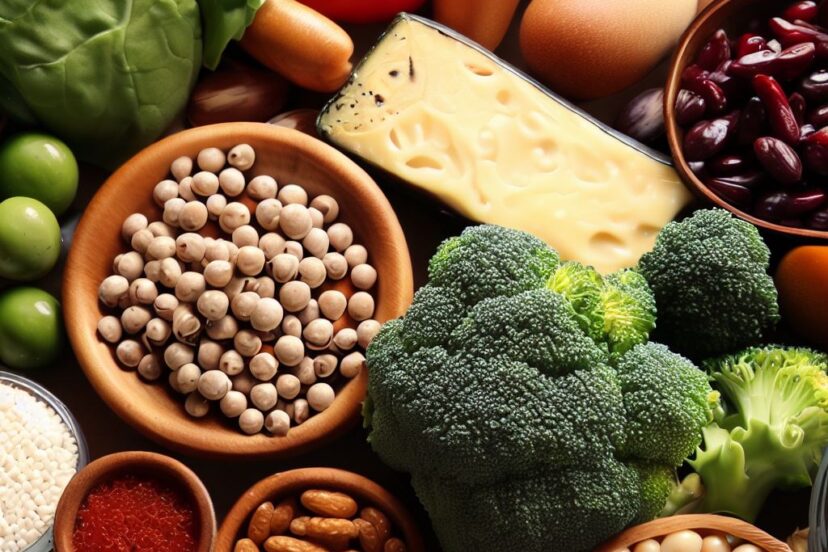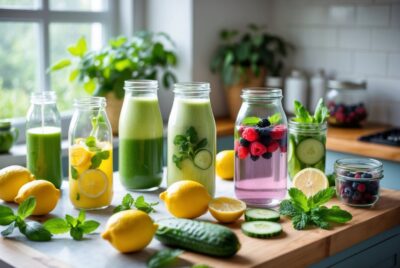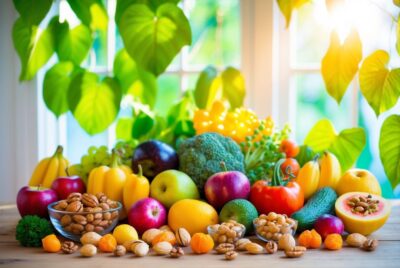Vitamin B12 Foods Vegetarian: Full Guide
*We may earn a commission for purchases made using our links. Please see our disclosure to learn more.
Vitamin B12 Foods Vegetarian: Top Sources for a Plant-Based Diet
Let’s jump into Vitamin B12 Foods Vegetarian style! Vitamin B12, a water-soluble nutrient essential for nerve function, DNA synthesis, and red blood cell production, can be a point of concern for those following a vegetarian or vegan diet. While this nutrient is predominantly found in animal products, there are vegetarian and vegan-friendly sources that can help meet dietary needs without compromising personal dietary choices or ethics. I understand the importance of ensuring adequate B12 intake and the potential risks of deficiency, which include fatigue, impaired brain function, and nerve damage.

As a vegetarian or someone on a plant-based diet, it’s crucial to be aware of foods that are naturally rich in vitamin B12 or are effectively fortified. Dairy products and eggs are good options for vegetarians, while for vegans, the route to sufficient B12 levels lies in fortified foods like cereals, plant milks, and nutritional yeast. Mushroom and nori have also been discussed, but these sources can provide varying amounts of the vitamin. Supplements, when necessary, can be a reliable source, although the emphasis is on getting the nutrient from foods as much as possible.
My approach is a blend of being informed about the nutrient content of different foods and understanding how to incorporate these into a daily diet that aligns with vegetarian or vegan values. It’s not just about avoiding deficiency but also about optimizing overall health and well-being through thoughtful nutrition choices.
What Is Vitamin B12?

In my exploration of vital nutrients, Vitamin B12 stands out as an essential element that my body requires for various critical functions.
The Role of Vitamin B12 in the Body
Vitamin B12, known to me as cobalamin, is imperative for maintaining healthy nerve cells and is involved in the creation of DNA, which is the genetic material in all of my cells. It’s also crucial for the normal formation of red blood cells and helps prevent a type of anemia called megaloblastic anemia that makes people tired and weak.
Understanding Cobalamin
When I refer to Vitamin B12, I’m referring to cobalamin, which is the largest and most complex vitamin my body needs. It is unique, containing a metal ion, cobalt. There are several forms of cobalamin, but all have a fundamental role in protecting the nervous system and aiding in the formation of red blood cells in my body.
Sources of Vitamin B12 for Vegetarians

In my search for adequate vitamin B12 sources, I have focused on those suitable for vegetarians. While B12 is predominantly found in animal products, my aim is to highlight how vegetarians can ensure sufficient intake of this essential vitamin.
Dairy Products and Eggs
- Milk: I find that cow’s milk is a reliable source of B12, offering about 0.9 micrograms per cup.
- Cheese: A slice of Swiss cheese can provide about 0.9 micrograms of B12.
- Eggs: With 0.6 micrograms in one large egg, they are an excellent addition to a vegetarian diet for a B12 boost.
Milk and dairy products like cheese and yogurt, along with eggs, offer quite a bit of flexibility in a vegetarian diet. They are not only rich in B12 but also in other essential nutrients like protein and calcium.
Fortified Foods
- Cereals: I have verified that fortified cereals can provide up to 100% of the daily value for B12 in a single serving.
- Plant-based milks: Fortified soy, almond, and rice milks often contain about 1.2 micrograms per cup.
By incorporating fortified foods into my diet, such as cereals and plant-based milks, I can easily meet my daily B12 requirements. These products are especially important for those who have less access to other B12 sources or prefer not to consume dairy or eggs.
Nutritional Yeast and Algae
- Nutritional Yeast: This is a staple in my kitchen as it contains about 24 micrograms of B12 per tablespoon.
- Mushrooms: Certain types of mushrooms, especially those exposed to UV light, can also contribute to B12 intake.
Nutritional yeast and certain algae like spirulina are beneficial for vegetarians. It is versatile and can be sprinkled on various dishes for a cheesy flavor and a significant B12 boost.
Health Benefits and Functions of Vitamin B12

Vitamin B12 is a crucial nutrient for maintaining overall health. My discussion here focuses on how it supports the prevention of anemia, boosts energy and metabolism, and maintains the nervous system.
Preventing Anemia
Vitamin B12 plays a vital role in the production of red blood cells. I understand that a lack of B12 can lead to a specific type of anemia called megaloblastic anemia which causes fatigue and weakness.
Energy and Metabolism
A key function of Vitamin B12 in my body involves energy production. It is essential for converting the food I eat into glucose, which is used as energy by my body. A sufficient level of Vitamin B12 helps combat feelings of fatigue and supports high energy levels.
Nervous System Health
For the nervous system to function effectively, Vitamin B12 is indispensable. It contributes to the health of nerve cells and supports the production of myelin, the protective sheath that covers nerves and is necessary for transmitting signals efficiently within my nervous system.
Understanding Vitamin B12 Deficiency

In addressing vitamin B12 deficiency, I’ll explore its primary risk factors, the symptoms and methodology for diagnosis, and the existing approaches for treatment and management.
Risk Factors for Vitamin B12 Deficiency
Vitamin B12 is a crucial nutrient, and its deficiency can occur due to various factors. As a vegetarian or vegan, my dietary choices significantly increase the risk of B12 deficiency since plant-based diets often lack sufficient B12 sources. Moreover, the elderly have a higher deficiency risk due to decreased absorption capability. Other risk groups include individuals with pernicious anemia, a condition that impedes B12 absorption, and pregnant women who require higher B12 levels for fetal development.
Symptoms and Diagnosis
If I’m B12 deficient, I may experience symptoms such as numbness and tingling in the hands and feet, which are neurological signs. Additionally, I may feel a general weakness or fatigue. Diagnosis of B12 deficiency typically involves blood tests to assess levels of the vitamin, along with a complete blood count to check for anemia.
Treatment and Management
To treat this deficiency, oral supplementation or injections of vitamin B12 can be effective. As someone following a vegetarian diet, I must regularly consume fortified foods or take supplements to manage my B12 intake. For those diagnosed with pernicious anemia or others unable to absorb B12, ongoing injections or high-dose supplements may be necessary. Regular monitoring, with the help of healthcare professionals, ensures that the treatment is effective and deficiency symptoms are addressed.
Incorporating Vitamin B12 into a Vegetarian Diet

In my vegetarian diet, ensuring I get enough Vitamin B12 is critical for maintaining my nerve function and blood health. Below, I’ll discuss practical strategies to achieve this.
Diet Planning for Adequate Intake
To maintain adequate B12 levels as a vegetarian, I focus on including natural sources like dairy products and eggs. I usually incorporate a variety of these foods into my meals:
- Dairy: Each day, I consume a serving of yogurt or milk, which provides a substantial amount of B12.
- Eggs: Including at least one large egg in my diet, knowing it contains about 0.6 mcg of B12.
In addition to these, I routinely consume fortified foods such as cereals and plant milks. These foods are enhanced with B12 and other essential nutrients, which helps vegetarians like me meet our dietary requirements.
Supplementation
While food sources are significant, I also consider the role of B12 supplements to ensure I’m not falling short, especially since the absorption of vitamin B12 is complex and involves the intrinsic factor — a protein my stomach makes to absorb B12. Here’s my approach with supplements:
- Regular B12 Supplements: I sometimes take a daily supplement containing at least 2.4 mcg of B12, the recommended dietary allowance for adults.
- B12 Injections: If I suspect absorption issues, which a healthcare provider might help identify, the alternative could be B12 injections.
Reading Food Labels
Carefully reading food labels allows me to identify fortified foods that are a good source of B12. I make sure to check for the specific B12 content and the form of the vitamin. Cyanocobalamin is what I look for, as it’s a highly absorbable form. Here are the steps I follow:
- Find the Nutrition Facts label.
- Locate ‘Vitamin B12’ under the micronutrient section.
- Check the Daily Value (DV) percentage to assess how much one serving contributes to my daily intake.
By meticulously selecting fortified foods and understanding their labels, I comfortably meet my nutritional needs on a vegetarian diet.
Frequently Asked Questions
In addressing key inquiries on vitamin B12 for vegetarians, I focus on reliable sources, understanding of diet diversification, and awareness of deficiency symptoms for a balanced vegetarian lifestyle.
1, Which vegetarian foods are good sources of vitamin B12?
Fortified cereals, nutritional yeast, dairy milk, plant-based milks, tempeh, natto, yogurt, and eggs are some of the principal vegetarian foods rich in vitamin B12. I ensure that I include these foods in my diet to meet the recommended daily amount of this essential nutrient.
2. In which fruits can vitamin B12 be found?
Vitamin B12 is not naturally present in fruits. Therefore, I don’t rely on fruits for my vitamin B12 intake. Instead, I look to fortified foods and supplements to meet my nutritional needs.
3. How can vegetarians ensure they are getting enough vitamin B12 from their diet?
To secure adequate B12 intake, I include a variety of fortified foods in my meals and check nutrition labels for B12 content. I might also consult with a dietitian to ensure my dietary plan is well-rounded.
4. What are some options for obtaining vitamin B12 from plant-based diets?
Options for obtaining vitamin B12 on plant-based diets include consuming fortified plant milks, meat substitutes, and breakfast cereals. Additionally, nutritional yeast is a popular choice I use for its cheesy flavor and B12 fortification.
5. What symptoms should vegans monitor for vitamin B12 deficiency?
Symptoms of vitamin B12 deficiency I stay vigilant for include fatigue, weakness, constipation, loss of appetite, and numbness or tingling in the hands and feet. Regular blood tests can help monitor B12 levels.




